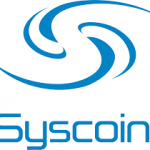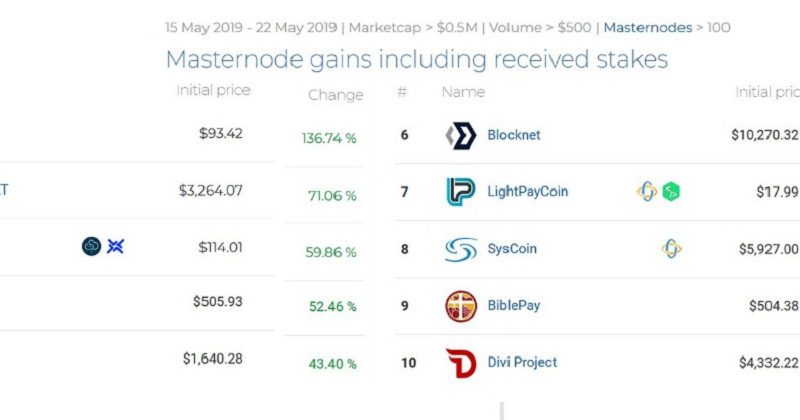Top 10 Masternodes Last Week
Crypto masternodes hit the news last week with some gaining by as much 136%, with a lot of changes on which masternodes dominate the top ten lists. According to Masternode.buzz, the top ten masternodes in the last week were Vulcano which gained as much as 136% in a weekly price change, followed by ColossusXT at 71% and Giant 60%. Others in the list included PURA, Rapids, Blocknet, LightPayCoin, Syscoin, BiblePay, and Divi Project.
Here's an overview of the top ten masternode projects for last week.
1. Vulcano
Vulcano, which is a proof-of-stake masternode -- with staking and masternode features -- focuses on geothermal research and development for sustainable development. Last week it was the top gainer among all masternodes tracked by Masternode. Online by as much as 136%.
The project was started in 2018 although the coin entered the market on September 2017, is named after the Tyrrhenian Sea known as Vulcano Island, and facilitates sustainability research and scholarships by supporting this research through funding with funds being derived from masternode governance fees, although the governance aspect activated this past March. The project is also involved in partnerships with different universities.
It also started as a hybrid of Proof-of-Work/Proof-of-Stake consensus mechanism and later switched to Proof-of-Stake consensus mechanism in order to stay true to the coin's environmental research beliefs. They then switched to own blockchain for additional security and to facilitate faster transactions.
Although holders can earn VULC coin through staking and masternodes, the Moho Project will in future add the proof-of-work component on the Vulcano blockchain, and the proof of work is not proof of work mining but the delivery of $VULC to those who contribute to a distributed computing system, similar to Berkeley’s BOINC network. Project Moho was planned for testing in Q3 this year. Proof of work will require greater computational resources than masternodes.
Masternodes on this blockchain are supposed to hold the entire blockchain in real-time, and they can thus perform additional services for blockchain users such as ensuring the privacy of transactions. Masternodes also get to vote on necessary protocol changes and are critical to enabling budgeting and treasury systems within the blockchain. Running a masternode requires 50,000 VULC, while the wallets are supported on Windows, Mac OS, and Linux. A user can install the masternode on VPS (VPS which has at least 1GB of RAM and 10GB of free disk space for stability), and using elastic cloud services like AWS or Google Cloud for masternodes is not recommended.
For further details on installing this masternode, check this link:
For comparison investment of this and other masternodes including ROI etc, you can visit Masternodes.Online comparison tool on this link.
2. ColossusXT
ColoSSusXT coin was started on 22 August 2013 as an open-source shared, decentralized energy-productive computerized money, intended to facilitate instant payments globally with no fees and with top-privacy features. Its most-recent form ColossusCoinXT protocol makes use of the Proof of Stake (PoS) V3.0 protocol built for PIVX that has a settled PoS block reward.
The platform features Colossus Grid, ARMIS to anonymize transaction through the ZeroCoin protocol, Colussus Grid, and MarketPlace, ColossusXT Debit Card, Atomic Swaps; payment gateway and wallet services such as MyCryptoCheckout, Polispay, Plaak, Pecunia; e-commerce FLOGmall,
The coin has both masternode and staking features in addition to Private Send, in-wallet encryption, and decentralized governance. For masternode, one requires 10,000,000 coins. The reward model relies on an exceptional Seesaw Reward Balance technique between staking hubs and the masternodes.
For staking, coins have to mature by storing them for at least 8 hours in a staking wallet. One can run multiple masternodes but will require a VPS. In addition, to earn income for supporting the network, masternodes also require to create proposals in order to support the development of the network. For masternodes, one will need two wallets; the MN server wallet, which processes ColossusXT transactions, verifies new blocks created and distributes blocks to ColossusXT users; and the local control wallet which holds the collateral, receives rewards and is used to start and stop the MN server wallet.
For further details on how to install and run this masternode, visit this masternode installation guide on their website. Otherwise, it can be installed on Windows and OSX, Linus, and VPS. Among the masternode services (StakingLabs, Evonodes, Linda, Kalkulus, GIN Platform, NodeStop, IHostMN, NODEshare, Pecunia), there is also the option of a shared masternode.
For comparison investment of this and other masternodes including ROI etc, you can visit Masternodes.Online comparison tool on this link.
3. Giant
Giant is a blockchain that supports JavaScript-based smart contracts, giving it flexibility and making it easier even for average developers to work with. Creating smart contracts on the platform requires one to run a masternode, which means the two things are inseparable.
It uses Proof-of-Stake and has staking feature; a shared proof of stake pool known as Giant.ColdStake where many users contribute coins for staking and which does not require the wallet to be connected to the network; as well as a decentralized binary options marketplace (Giant.Exchange) on which trustworthy assets data controlled by an independent arbiter and has automatic terms execution and public Broker reputation system; and a decentralized betting marketplace (called Giant.Bet) based on smart contracts. The platform token Giant Coin is spent in the payment of products. It is compatible on Windows, Mac OS, and Linux.
Coming in Q2 for release by this project is the Giant Contract Testnet release, Giant. Exchange beta testing, Giant Virtual Machine, and GEX Trading Interface as well as the Contract Development Kit release.
Running a Giant masternode requires about 1,000 GIC, which is around $218,000 at the current price. Please refer the instructions for setting the masternode from this guide, through a VPS such as Vultr VPS, and cold node.
For comparison investment of this and other masternodes including ROI etc, you can visit Masternodes.Online comparison tool on this link.
4. PURA
PURA is a social and sustainability-focused payment coin that enables fast, direct, private, and instant payments without the need of banks and middlemen. It also now features the PURA Aurora AI, which enabled their latest advanced blockchain payment coin with artificial intelligence, push-to-deploy masternodes, mobile mining, and common nodes.
PURA also diverts 10% of all PURA coins into environmental or social projects through PURA Planet, it’s treasury and funding platform. In other words, 10% of all mining rewards mined with PURA are donated to a cause of the community's choice. These include energy conservation, water cleaning, food supply projects for developing countries and more.
That said, it supports mining through a miner client (GPU) or X11 hardware. The mining is based on algorithm X11. The introduction of the PURA Dawn update of the original PURA coin in September 2017 introduced fairer mining to enable individuals better compete with large mining pools without needing to invest large sums of money in specialized mining equipment. The wallet will also be supported on iOS and Android.
Merchants can also register their businesses to receive payments for goods and services at zero fees.
For masternode interests, the update to AI-focused system introduced the Pura Aurora, or the “push to deploy”-masternode-function, where one does not need to set-up a server or have basic programming skills. One is only required to download Pura Aurora wallet and transfer 100,000 Pura to their wallet and push the masternode button to install and deploy and wait for the passive income. At 100,000 PURA or current $794, one can run a masternode and earn passive income.
For instructions on setting up a PURA masternode, refer to this guide from their website.
For comparison investment of this and other masternodes including ROI etc, you can visit Masternodes.Online comparison tool on this link.
5. Rapids
Rapids is an ERC20 token that facilitates sharing of Rapids through Web Browser and Social Media enabled Widgets. Their social media implements Tip Bots to enable users to share RPD as tip via social media. The platform also features debit and cold storage cards in order for users to store and manage their coins easily. It integrates with common social media platforms such as Twitter, Telegram, Discord, and Twitch.
The payment feature allows users to send RPD payments across blockchains via social media where users will only require account name or handle of the recipient to send the payment instead of a crypto wallet address. The recipient will still receive the cryptocurrency instantly in their Rapids wallet.
It has staking and masternode features; their two-tiered consensus and reward model rewards 2140 $RPD per block via masternodes and 1070 $RPD for staking nodes per block. It offers 60% ROI for MNs and 30% ROI for staking nodes, with 10% burned.
Setting up and running a Rapids masternode requires 10,000,000 RPD (around $2840 at current price).
6. Blocknet
Blocknet is a 2nd layer blockchain interoperability protocol which enables communication, interaction and exchange between different blockchains. Thus, with the protocol, developers can develop dApps that can work across multiple blockchains or what is referred to as cross-blockchain interoperability; as well as create microservices. The Blocknet protocol facilitates true peer-to-peer communication between nodes on different blockchains and these can then exchange data.
Regarding governance, service nodes or masternodes vote to fund proposals from the community.
Their first dApp was Block DX, a decentralized exchange that allows peer to peer trades between parties.
In regard to masternodes, the network also allows for staking and also masternodes. The split between the two is 70% and 30%. One requires 5000 BLOCK (the equivalent of $1600 with today's price) to run a masternode. One basically requires two computers; a collateral computer and SNode computer, and it is also possible to configure the masternode to support XBridge decentralized exchange component of the Blocknet Protocol, XRouter or the decentralized inter-chain communication component and the XCloud or a decentralized microservice cloud network build on XRouter.
For detailed information and investment comparison for this masternode, please refer to this link on Masternode.Online website.
7. LightPayCoin
LightPayCoin allows for staking and masternode and works as a payment coin or exchange for goods and services. Thus, the team is planning ATMs, wallets, point of sale devices, and is collaborating with UCF (University of Central Florida) for the implementation of contactless payments using NFC (Near Field Communication) technology on phones Android and IOS. Through NFC technology, users will be able to make phone-based payments for any service on a peer-to-peer basis.
The main features will be the exchange of LPC for dollars and euros and cashing out through ATMs.
The blockchain utilizes Quark algorithm and the split between masternodes and staking rewards is 65%/35%. A masternode requires 1000 LightPayCoins (current value of $106.3 only at today's price). The detailed setup guides are on this page.
For investment comparison, ROIs and other details, refer to this link.
8. SysCoin
SysCoin masternodes are based on Dash code but enhance with Z-DAG governance issuance and seniority in order to increase transactional throughput. The masternodes feature Z-DAG Protocol’s instant Asset transfer and facilitate future features and services on the blockchain. Masternodes also vote, each month, on development proposals submitted by the community.
In regard to rewards, masternodes get 75% of all block rewards with the likelihood of a masternode receiving a payout being inversely proportional to the total number of masternodes on that network. Masternodes also receive a 35% bonus to their base reward after one year as seniority benefit if the collateral for an active Masternode is kept locked at the same address for the entire qualification period.
100,000 SYS (the equivalent of $6980 in total at current market price per coin) is the amount required to be locked in order to host a masternode and this must be locked for the lifespan of the masternode though the owner can withdraw it at any time. In addition, a masternode requires Ubuntu 18.04.1 LTS with C++17 compiler+ KVM or OpenVZ (KVM preferred), 2 Core x64 CPU w/SSE(4 Core Recommended) and 4GB+ RAM(8GB+ Recommended)4GB Swap File if under 8GB, 80GB+ SSD Hard Disk(100GB+ Recommended) and Static IP Address. For detailed setup procedure of the masternode, check this blog.
For investment comparison, ROI and other details regarding this masternode, check this link from Masternode.Online.
9. BiblePay
BiblePay is a Christian charity cryptocurrency where 10% of rewards go to charity to support courses in countries such as Uganda and Sierra Leone, bible verses are coded into blockchain, 40% to masternodes (Sanctuaries), and 40% goes to miners.
Masternodes, which form a a Decentralized-Autonomous Charity (DAC) network, provide InstantSend to allow for instant sending of payments, and PrivateSend for anonymous sending of coins. Besides, they handle the monthly BiblePay Budget Superblock payout which contain 20% of all generated coins that month. The In Wallet Prayer System, Gospel Links, reward those watching edifying Christian videos. Proof-Of-Distributed Computing will see Cancer Research diverting mining waste heat towards true Research while Unbanked Cancer Mining will help those in third world countries buy groceries with Mobile Phone Mining.
The cryptocurrency uses Proof-of-Bible-Hash algorithm and supports CPU mining.
A masternode requires 1,550,001 BBP (equivalent of $264 at today's price) to run. The set-up includes a One Click Masternode Install Script and the setup guidelines are here.
Investment comparison stats are here.
10. Divi Project
Divi Project masternodes are deployed in a One Click Cloud installation (MOCCI) and which is the simplest masternode to install, alongside the No-Click staking. Their masternodes are five level tiered, meaning five entry points depending on the number of coins you want to invest in a masternode.
Divi uses Proof of Stake (PoS) and with a One-Click install, you can deploy a masternode without any technical knowledge in setting up one. You just download and install and you are ready to go! Besides, they are developing a Smart Wallet that will facilitate e-commerce at better user experience and with ease, have Lottery Blocks feature that allows users to stake 10 000 DIVI to be eligible to win weekly rewards of 25,200 DIVI and one lucky participant with 252,500 DIVI.
The five tiers are Copper, which requires 100,000 coins to run, Silver 300,000 DIVI, Gold 1,000,000 Divi, Platinum 3,000,000 coins, and Diamond 10,000,000. The chances of earning rewards increase by 5%, 10%, 15% and 20% up the ladder with Diamond having highest chances (20%) of winning rewards.


